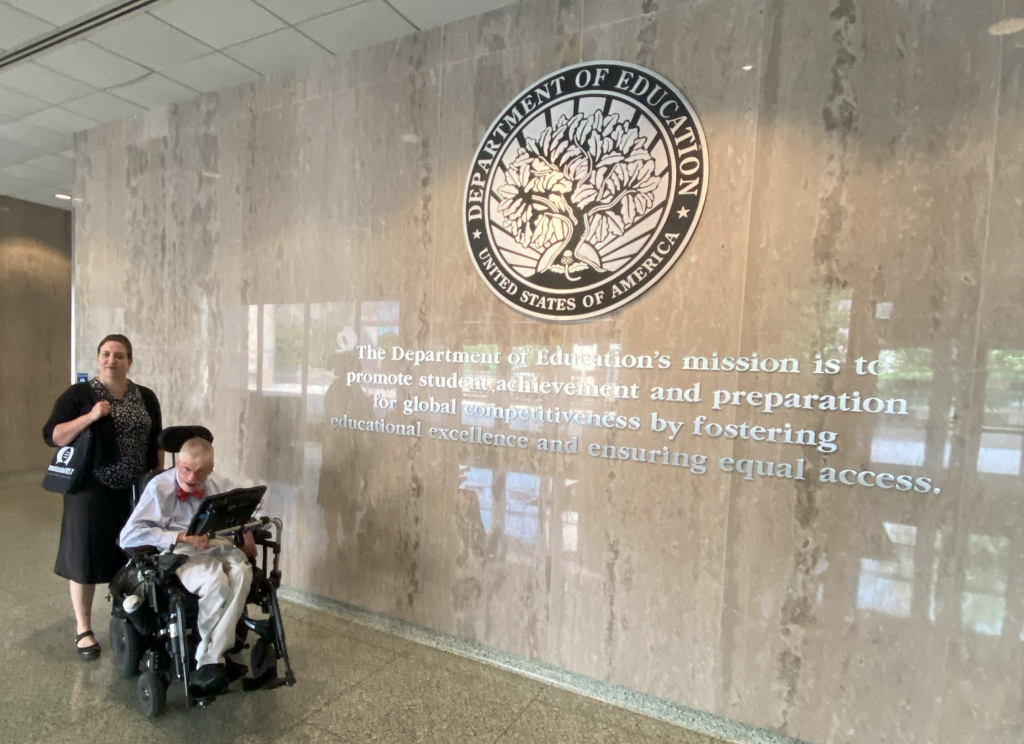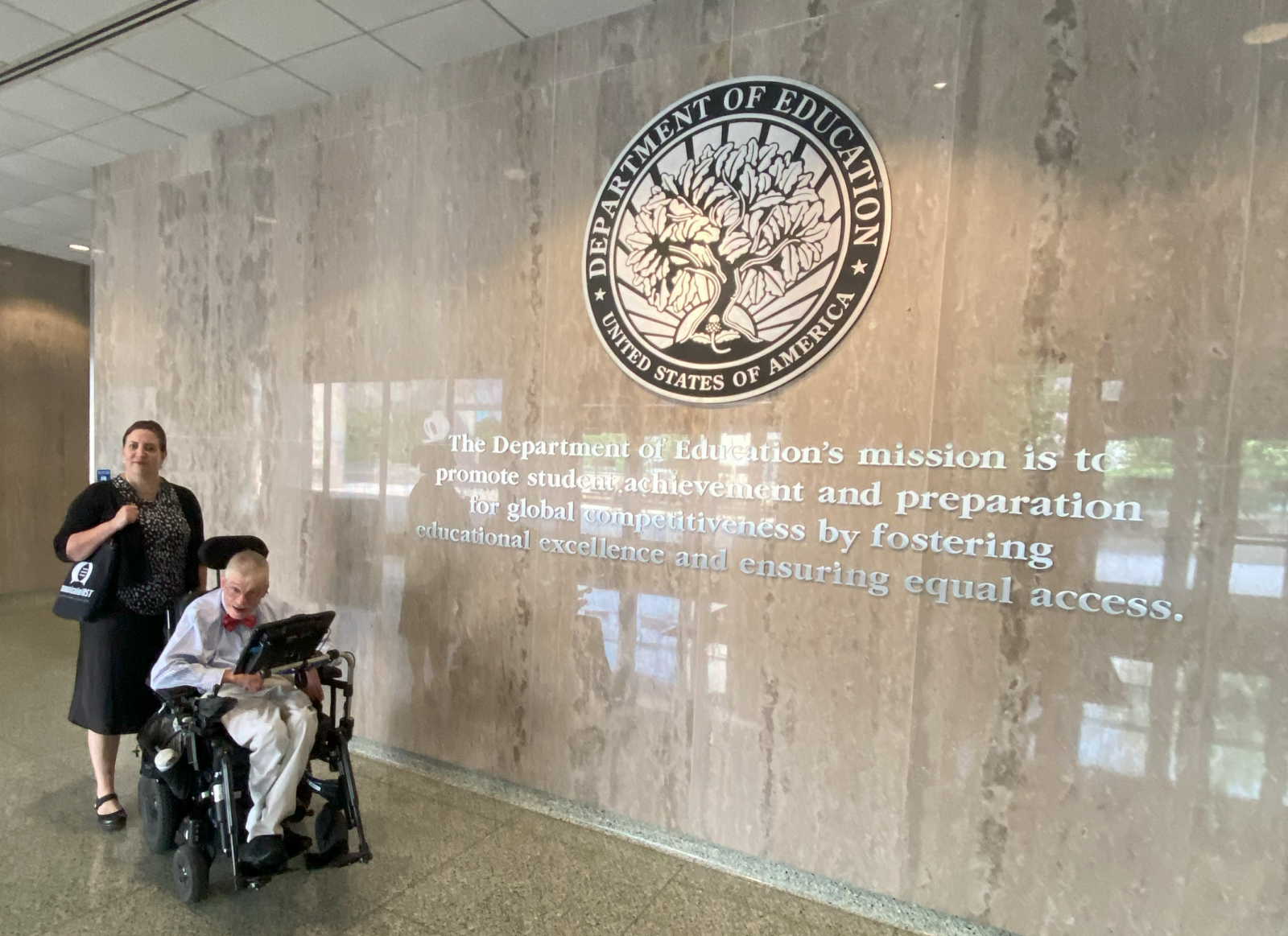Remarks to the Office for Civil Rights, US Department of Education
COMMUNICATIONFIRST POLICY DIRECTOR BOB WILLIAMS
August 22, 2023

I am Bob Williams, the Policy Director and co-founder of CommunicationFIRST. Thank you for meeting with us.
We are the only civil rights and disability justice organization that is led by and dedicated to securing the equal rights and opportunities of the roughly 5 million children, young, working-age, and older people who due to disability cannot effectively express ourselves, be heard, and live our lives.
I want to stress that last bit, because it is central to the systemic discrimination our kids are stymied by each day, solely because they cannot rely on speech because others fail to understand it. Consequently, they and I must use a wide range of augmentative and alternative communication, or AAC, tools and support to be understood.
We are meeting with you principally for the following reasons.
First, we want to make clear to you, as we have and will continue to do with others in the Administration, that laws like the IDEA, Section 504, and the ADA are not now and have never been enforced to secure the full rights of students and others who require yet are typically denied access to effective, language-based AAC. This must change.
Second, we want to identify some of the major ways and reasons why we believe such disability-based and co-occurring racial and language-based discrimination is both standard practice and deeply harmful in school systems across the country.
And, third, we want to offer recommendations that this Department and others should take to remedy the tremendous injustice and lifelong pain constantly inflicted on young people needing AAC.
I will not take time to tell my story. But, suffice it to say, I escaped the very worst that hundreds of thousands of baby boomers like me endured: institutionalization, isolation, illiteracy, and silencing. We believe that many — and likely most — young people needing AAC today are suffering virtually the same fate I escaped over 50 years ago. The following are among the chief causes and consequences of this unconscionable status quo:
The first is that no uniform data is collected on the number and characteristics of young children, school students, and transition-age young people who need AAC. The practical reason for this is that youth who need AAC for effective communication and to receive an equally effective, integrated education have a vast range of significant, often multiple disabilities and conditions that are classified and subsumed under several of the IDEA disability categories that ED uses to collect data. Consequently, it is impossible to identify or track anything about kids who need AAC: whether they have or lack access to it, their demographics, the extent to which they are segregated, institutionalized, restrained, expelled, secluded, and abused. Nor is there any accurate, valid way to know what some school districts are doing in order to do right by them.
Hopefully, even in these times, very few would try to justify the failure to collect data necessary to ensure the effective communication and language access rights of students who are blind, deaf, or English learners. It just would not and should not be done. The same must be true in this case. We are not recommending that ED ask Congress to create another disability data category. It would be futile to do so, and there are more immediate steps ED can take to begin to address this problem.
We think this should begin with informing districts of their obligation to comply with ED’s November 2014 joint guidance with DOJ on assuring the rights of all students with communication disabilities, and that this includes collecting, analyzing, using, and making public data available on the extent to which the rights that students who need AAC have to effective communication and equal educational opportunities are being affirmed or abrogated. Absent such data, it will continue to be a game of don’t ask, don’t tell.
We also strongly believe OCR and DOJ should jointly investigate and take action to bar what appears to be the continued, widespread, and life-damning practice of districts to conduct standardized IQ assessments on students who lack access to the AAC to respond to the questions — and then to use the blatantly biased results to make educational and placement decisions that cripple these youngsters’ lives and, to paraphrase Brown v. Board of Education, to generate a feeling of inferiority that affects their hearts and minds in ways unlikely ever to be undone.
Comprehensive data, as I noted, is lacking. But inferences can — and frankly must — be responsibly made based on the Department’s own data, research, and the examples that we at CommunicationFIRST are hearing and witnessing that indicate that the civil rights laws of our country meant to bar discrimination on the intersecting bases of race, disability, gender, language, and creed are being carried out, and enforced, in ways that fail all kids — and kids who require AAC in particular who are disproportionately and unjustly denied it, denied access to the general curriculum, and denied the basic reading and writing skills that I managed to acquire and are the reason I am here speaking to you right now.
Moreover, when these kids leave school, research indicates that the vast majority lack the AAC tools and the literacy they desperately need to communicate, to live, and to be valued as equals in their community. Instead, they are subjected to lifetimes of what Justice Ginsburg termed “unjustified isolation” and ruled was prohibited by the ADA and Section 504.
As you know, the Justice Department sued the State of Florida for exiling kids to nursing homes — many if not most of whom likely need AAC. In his recent ruling to halt and remedy this practice, U.S. District Judge Donald Middlebrooks stated that the ADA makes clear these kids “deserve equality and freedom from isolation.”
We fervently hope that ED will work with DOJ, HHS, school districts, and stakeholders like us to make this a reality for all kids unjustly isolated, silenced, and deprived of literacy and freedom of expression, regardless of setting.
We are eager to explore how we can assist in these efforts. And I thank you for your indulgence.
* * *
Download in PDF format here.

